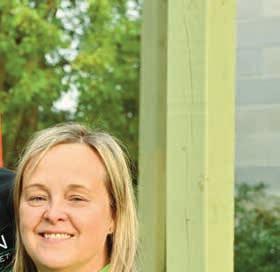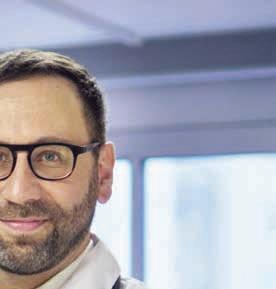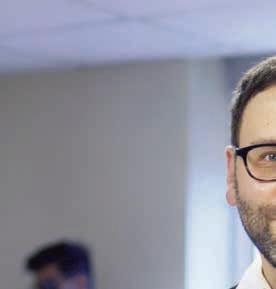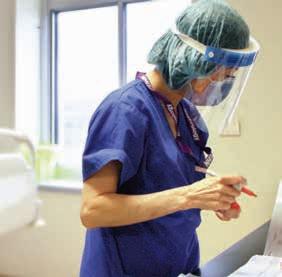BRINGING PEOPLE TOGETHER IN A TIME OF NEED










SPECIAL SUPPLEMENT INCLUDED IMPACTS & OUTCOMES OF KIDNEY
IN
RESEARCH
CANADA 2021 IMPACT REPORT
OUR VISION
Excellent kidney health, optimal quality of life for those affected by kidney disease, and a cure.
OUR MISSION
The Kidney Foundation of Canada is the leading charity committed to eliminating the burden of kidney disease through:


n Funding and stimulating innovative research for better prevention, treatments and a cure;

n Providing education and support to prevent kidney disease in those at risk and empower those with kidney disease to optimize their health status;
n Advocating for improved access to high quality health care;
n Increasing public awareness and commitment to advancing kidney health and organ donation.

COVER: Francine and Louise participate in a virtual peer support meeting.
 RICHARD DUBOIS
RICHARD DUBOIS
 PHOTO:
PHOTO ON RIGHT: Eric Chandonnet, transplant recipient and Tour de rein organizer, with his wife, Nadine.
PHOTO: MARTIN ALARIE
PHOTO:
PHOTO ON RIGHT: Eric Chandonnet, transplant recipient and Tour de rein organizer, with his wife, Nadine.
PHOTO: MARTIN ALARIE
MESSAGE
FROM THE PRESIDENT AND NATIONAL EXECUTIVE DIRECTOR

In 2021, as we grappled with year two of ongoing lockdowns and restrictions due to COVID‐19, it would have been easy to focus on what we have lost.

Dialysis and transplant communities were hit hard by the pandemic, which by the end of 2021 had overshadowed everyone’s lives for 21 long months.
At The Kidney Foundation we strived to adapt and be nimble. In 2020, our in‐person events and fundraisers, kidney camps and peer support groups were canceled but we persevered and continued many of them as virtual activities. Our research grants were paused for three months as research labs were closed across the country. We never gave up through all this and the Foundation emerged even stronger in 2021.
We transformed in‐person programs to virtual opportunities, and we were committed to reaching just as many people, if not more, using digital platforms. Our virtual peer support program spread into rural and remote regions and engaged people who may not have been able to access face‐to‐face sessions previously. We held our first virtual educational forum; patient and caregiver input drove the content and topics. Requests for programming included topics to help them develop coping skills to manage their mental health and overall well‐being during these unprecedented challenging times. Over 800 registrants participated in that forum.
Our regular educational webinars saw record registrations as well, and our updated Kidney Community Kitchen website, complete with a new meal planner tool, attracted 500‐1,000 visitors per day. We held our first virtual Kidney Kids Camp, helping kids with kidney disease from across the country to know that they were not alone.
In 2021 we honoured all our research commitments including grants paused in 2020. We funded 31 new grants and raised over $100,000 through our End Diabetic Kidney Disease (EDKD) campaign. The EDKD campaign will help to support an exciting new clinical trial that may transform the outcomes for people with Type 1 diabetes.
The Kidney Foundation of Canada has been Can‐SOLVE CKD’s most important partner since the network’s inception, supporting the creation of new knowledge about kidney health and treatment options. We have pledged $1.8M to continue our support and partnership in the anticipated next phase of the Can‐SOLVE CKD research initiative, to support knowledge translation and implementation of learnings from 18 research projects into practice.
Throughout the pandemic, we have advocated to protect the patient population ‐ those on dialysis and those who have or are waiting for a transplant. As an overall population, they are more vulnerable to complications of COVID‐19. The safety and health of our community has always been top of mind and at the forefront of our decision making.
Our experiences with COVID‐19 were fundamen‐tally important to our organizational vision for the future. We wrapped up 2021 by developing a new 2022‐2024 strategic plan. The plan focuses on four key priorities that are fundamental to our work: advocating for patient access to treatment, raising awareness of kidney disease to bring it out of the shadows as a serious health issue, ensuring the necessary funding to support programs, services, and research, and engaging volunteers to support life‐changing work for all Canadians impacted by kidney disease.
kidney of

We are incredibly grateful for those who have given generously to support the kidney community in a time of great need, from our dedicated volunteers, partners, staff, and board members to those who made financial gifts and participated in our events.
The passion of our kidney community, the resolve of our researchers, and the exceptional support of donors have been with us through thick and thin, and your dedication and support has fueled our work. For this, and all you do, we thank you!
SYLVIE CHARBONNEAU National President

 ELIZABETH MYLES National Executive Director
ELIZABETH MYLES National Executive Director

3
PEER SUPPORT: CREATING A COMMUNITY IN A TIME OF REAL NEED
For many people newly diagnosed with kidney disease, peer support is a truly indispensable resource for their emotional wellbeing. Additionally, it offers an opportunity for people living with kidney disease and caregivers, to interact and engage with peers who have experienced similar issues and questions as themselves.

As a core program for The Kidney Foundation, peer support has typically been available through in‐person interactions in groups with a trained volunteer, or by phone one‐on‐one. After March 2020, with in‐person activities cancelled, economic and job anxieties reaching an all‐time high, and isolation impacting emotional wellbeing more than ever, the need for peer support grew significantly. Craig Lindsay, Senior Manager of Programs and Public Policy for the Ontario Branch, reported that those reaching out to peer support groups had more than doubled by 2021. Similar increases in demand for peer support services were felt throughout the country.
Like many other organizations, the lockdown required The Kidney Foundation to pivot peer support programs entirely to an online model.
In the first couple of weeks during the shift to virtual peer support groups, Craig worried that people wouldn’t feel safe sharing delicate stories on web‐based meeting platforms. Indeed, the transition to hosting support groups online happened so swiftly that staff and volunteers were essentially learning the technical ropes at the same time as those attending.
“Virtual formats for peer support allowed easier cooperation and sharing of resources and expertise from all branches of the Foundation,” adds Craig.


Despite any initial worries, the transition to a virtual model presented numerous opportunities for connection. One of the most obvious benefits of the new approach is the sheer accessibility of it; people seeking peer support from around the country could simply turn on their computers and join from their living room, regardless of where they live, and it removed barriers to program access, like the cost of transportation to attend an in‐person meeting.
With the increase in attendance came another opportunity for growth in the development of more niche groups to facilitate more
detailed conversation. A peer support group dedicated to parents of children living with kidney disease, for example, allowed those individuals to have space to pose questions specific to their concerns and the conversa‐tions in those spaces could become richer and deeper than ever before.
The format has also expanded the Founda‐tion’s opportunities to invite kidney health care specialists and other experts into the sessions to lead more structured discussions on specific topics. To give a better idea of how well‐received this idea was, Craig noted that the group size increased nearly threefold when specialists started attending groups.
The new virtual support model also enabled new participants to bypass a kind of psychological fear of reaching out for support. According to Louise, a participant in peer support meetings, there have been many attendees during virtual support sessions who initially left their cameras off, only wanting to listen in. Gradually, they were able to gain enough confidence to participate in meetings and, in turn, share their own thoughts and questions.
The impact of peer support on the lives of those living with kidney disease and their caregivers is undeniable. “Peer groups supplied me with answers to questions I didn’t even know I had,” Louise said when recounting her own experience in seeking peer support after her diagnosis. For volun‐teers like Francine, who has been both a beneficiary of peer support and a volunteer group facilitator, the program has offered her a “sense of community.”

For those who are new to peer support as well as those who were already members of the community, the virtual format has offered a profoundly innovative and inviting experience, one that will be integral to the program going forward. In reflecting on the past two years and thinking about the future of peer support to come, Craig notes that while the requests for in‐person sessions are ramping up, virtual peer support will continue to be at the fore‐front of the program.
“As much as we often hear serious conversa‐tions and difficult questions posed in virtual groups, for the most part, there is a joyful and positive atmosphere in these created spaces. They share personal triumphs and celebrate accomplishments,” acknowledges Craig. “They talk about family, work, and travelling. There is a lot of laughter too. I think that’s one of the reasons we see so many people returning month after month, often to more than one group. They’ve created a community in a time of real need.”
People with kidney disease and their caregivers can request peer support services online or by calling 1 866 390‐PEER (7337).
Louise is a peer support participant.
Francine is a volunteer group facilitator.
VOLUNTEERS
TAKE TO THE AIRWAVES TO RAISE FUNDS

For nearly 25 years, The Chinese Renal Association has played a pivotal role in raising kidney health awareness. The volunteer‐led chapter was started by patients and nurses who felt education, information and support needed to be more readily available to Chinese‐speaking communities. Their many years of work resulted in a wealth of information and resources translated into the Chinese language. Many of these resources are available in the Kidney Health Resources section at kidney.ca.
People of Asian descent are at increased risk of developing kidney disease. Traditionally, the Association raises awareness through public kidney health education events, blood pressure clinics and fundraisers, but in 2021, the group took to the airwaves, hosting their first Chinese Radiothon on A1 Sing Tao Chinese Radio.

“A1 Sing Tao Radio, a national Chinese‐language radio station that operates in Markham, Ontario, hosts numerous charity radiothons throughout the year to support a wide‐variety of initiatives,” said Alan Hui, Chair of The Chinese Renal Association.
“But The Kidney Foundation’s radiothon was special, as we honoured the legacy of one of our founding members Benson Sy. Benson was a devoted member of the Chinese Renal Association, and he proposed the radiothon as a new way to raise funds and awareness in the Chinese community amidst the pandemic.”
While in the early days of planning, Benson passed away unexpectedly. His friends, family and fellow volunteers were committed to seeing the project through in his honour, never imagining that it would raise over $124,000 in a single day to support The Kidney Foundation’s Short‐Term Financial Assistance Program.
With a working group assembled, volunteers set out in unchartered territory. No one could have predicted the logistics needed to pull off an event of this magnitude. It started with developing a call to action and key messages, next was assembling a roster of guest speakers to fill 12 hours of on‐air programming. “Sponsorship, marketing, setting up the call centre for donations, training volunteers… The list was long, but we did it!” said Alan.
“We were thrilled with the results” added Alan in conclusion, “We set out to raise awareness of kidney health and raise much‐needed funds to support the kidney commu‐nity. We accomplished both goals with our very dedicated group of volunteers, and numerous supporters.”
KIDNEY CAMP FOR KIDS PROVIDED


VIRTUAL FUN
For most kids, summer camp had been a distant memory since 2019 as the pandemic precluded programs from operating in 2020. Families expressed their understanding when it was announced that residential camps in most provinces would not return in 2021 either. But, there was also disappointment that there was not an opportunity for their children to get together and have fun with others who know what its like to face kidney disease at such a young age.
As has been done with so many other activities across Canada, the team at the Northern Alberta & The Territories Branch rolled up their sleeves and got to work on creating a virtual camp environment instead. A virtual program was designed to provide arts, physical activity, learning in a fun format for the whole family.


Led by previous camp participants and staff, this year’s virtual campers were able to have their siblings and other family members get involved in the activities. They participated in yoga, origami, hip‐hop lessons, art projects, music, tent building (with their own couches and blankets!), growing plants, shirt tie‐dying, a virtual fireside chat and more.
Leading up to the two‐day online event, 345 kits were distributed to youth and their siblings across Canada so activities could be done at anytime. There were themes and suggested activities for each day leading up to and including the online sessions that were scheduled over two days; many supplies were provided in registration kits.
“Our online connections were filled with laughter and smiles,” said key organizer Flavia Robles, Executive Director at Northern Alberta & The Territories Branch. “It was great to see the artistic creations everyone came up with using their kits, and for us to be able to connect with families in this way.”
“Thank you for your continued support!
Kidney Camp for Kids was an amazing experience. The kids loved connecting with others. Thank you, Kidney Foundation, for the amazing opportunity to have my kids engaged and having fun.”
Michelle (mom of a virtual Kidney Camper)
Success
Julie
5
Members of the Radiothon working group with call centre volunteers on event day.
Jace paints stones with a kidney message.
with the origami instructions.
shows the tie dye shirt she created.
KIDNEY COMMUNITY
KITCHEN INTRODUCES AN

Bold and innovative change is not unfamiliar for The Kidney Foundation of Canada. In January 2020, we launched our new website, ushering in a new era of kidney awareness. Alongside our updated logo and website, The Kidney Foundation introduced a medley of new programs in order to continue offering unwavering support to those impacted by kidney disease.
Of those resources, the redesigned and improved Kidney Community Kitchen website, has already gone a long way in providing patients with invaluable recipes and tips on eating well. While being diagnosed with kidney disease necessitates a more conscientious approach to eating, that doesn’t mean that cooking can’t still be exciting and rewarding, which the Kitchen has largely demonstrated.
Now, adding on to the already invaluable resource of the Kitchen, The Kidney Foundation has introduced an improved meal planner, with some enhanced features.

The meal planner allows users to create and save daily and weekly meal plans. That sounds simple enough at first glance, but what makes the tool truly unique is its connection to the Canadian Nutrient File, a powerful database of ingredients. Whether users are looking to limit or achieve certain targets of sodium, potassium, protein, or phosphate – all very common with kidney disease diets – the meal planner calculates the nutritional content of recipes and ingredients, making it incredibly easy for users to understand the nutrients they’re getting at a glance.
More than just making it easier to plan your meals day‐to‐day, the tool allows users to achieve their nutrient requirements, and also cut back on food waste, save on groceries by structuring meals to use all ingredients, and helps them to manage stress about what to eat every day.
KidneyCommunityKitchen.ca has been receiving great praise, both from people affected by kidney disease and from subject matter experts. “In my research and preparatory work on the forthcoming program of International Federation of Kidney Foundations – World Kidney Alliance (IFKF‐WKA) on Renal Nutrition, Diet and Recipes, I have found the Kidney Community Kitchen a most unique and practical website for patients, with excellent information and supporting tools,” states
Dr. Siu‐Fai Lui, President of the IFKF‐WKA. “It is a very informative site for healthcare professionals.”
As the meal planner is part of the Kidney Community Kitchen website, users browsing through recipes can select their favourite recipes and add them straight to their plan.
The meal planner is a living, breathing resource. According to June Martin, RD, CDE, a kidney dietitian of over 20 years, who helped support its development, new recipes are reviewed and contributed to the website regularly. Ms. Martin would know, as she is one of the dieticians who answers questions online and reviews user‐submitted recipes.
She works alongside other dieticians, some of whom also contribute blog posts on a wide range of topics, including how to create a kidney‐friendly charcuterie board and holiday cooking. One of Ms. Martin’s recent blog posts, “Meal Planning with the Kidney Community Kitchen” is also fantastic reading material for newcomers to the meal planner.
6
UPDATED MEAL PLANNER
Chef Kris Gaudet hosts a cooking demo, one of the many enhancements made to KidneyCommunityKitchen.ca
A CAMPAIGN TO END DIABETIC KIDNEY DISEASE

n 1921, one of the most important medical breakthroughs took place here in Canada. The research team of Dr. Frederick Banting and Dr. Charles Best discovered insulin. The breakthrough, which earned the researchers a Nobel prize in physiology or medicine in 1923, improved the lives of millions affected by diabetes. A disease that was once a death sentence could now be managed and treated.
“The discovery made by Dr. Banting and Dr. Best underscores the importance of research and how it has the potential to improve and revolutionize treatment options resulting in real, quantifiable change for those affected by a condition or disease,” says Dr. Leanne Stalker, National Director of Research at The Kidney Foundation.
To mark the centennial anniversary of this most celebrated medical discovery in Canadian history, the Canadian Institutes for Health Research (CIHR) Institute of Nutrition, Metabolism and Diabetes launched a large‐scale strategic research initiative. 100 Years of Insulin: Accelerating Discoveries to Defeat Diabetes will see $20 million invested by CIHR and its partners on several diabetes‐related research projects.
communities agree that there is much work to be done in improving diabetic kidney disease diagnosis and management as well as education to improve the awareness surrounding the connections of these two conditions.
A rigorous competition was initiated to identify the research project that would be funded through this grant. “We’re pleased to be a funding partner for this important research initiative that leads the way for the next phase of Canadian discovery,” adds Dr. Stalker. The process included two rounds of peer review, which included participation from those with lived experience to ensure real‐world pertinence.
Detailed information about the research project that earned funding can be found on pages R3‐4 of the Impacts & Outcomes of Kidney Research in Canada supplement.

While the research competition was taking place, a campaign entitled End Diabetic Kidney Disease was launched to raise funds for this especially important initiative. Individuals whose lives have been deeply affected by diabetic kidney disease shared their stories to bring attention to this devastating and often overlooked disease.
For Cindy and the countless others who are affected by diabetic kidney disease, The Kidney Foundation is committed to participating in important initiatives like this one in the hopes that it will lead to more scientific breakthroughs, improved patient outcomes and transformative change; looking towards a future where diabetes does not have to be the leading cause of kidney failure.
DIABETES AND KIDNEY DISEASE
Kidney disease and diabetes are closely linked. Diabetes is by far the leading cause of kidney failure. Morbidity, mortality, and the cost associated with the disease are significant concerns. Scientific and clinical
The Kidney Foundation has committed a $1 million investment over five years to fund a major diabetic kidney disease research project as part of the 100 Years of Insulin initiative. CIHR will contribute an additional $1 million over the same timeframe.
Many people with diabetes, like Cindy, are not aware that they are at greater risk for kidney disease until they receive the diagnosis. “After my diagnosis, things went from bad to worse pretty quickly,” she recalls. “In just a few months, I was so swollen that I could barely move.” Dialysis treatments soon began, and she was placed on the waiting list for a transplant. The demanding dialysis treatments three times a week for four hours each time continued for three and a half years before she received news that her transplant would take place.
I
7
Cindy didn't know her diabetes put her at greater risk of kidney failure.
Even before the world was forced to pivot to doing things, The Kidney Foundation of Canada embraced the virtual landscape with its series of interactive webinars. Since then, digital meetings and conferences have become the norm, and the Foundation continues to spearhead new modalities of engaging with people living with kidney disease and caregivers.
In 2021, the Foundation held its first‐ever Virtual Forum: a three‐day online conference, featuring a variety of topics on living your best life with kidney disease, starting Tuesday, March 9 and concluding on World Kidney Day, Thursday, March 11.
The virtual medium allowed more attendees than ever to come together from across the country; patients, care partners, healthcare professionals, and researchers all over Canada could log in from their living room and join any of the 14 different sessions.


The 2021 Virtual Forum was innovative not only by virtue of its digital delivery method, but also for its patient‐centric approach. Jan Clemis, a volunteer with The Kidney Foundation for over 25 years and a patient herself, was one of many people who helped organize and create the forum. Planning began back in November 2020, when volunteers met virtually to brainstorm topics and start mapping out the conference.
Jan was part of the group that created the sessions on self‐advocacy, peer support, and virtual support; she was also one of the many volunteers who participated in hosting a panel discussion that she helped design. Working with a social worker to construct the sessions, she used her own experiences as a springboard for larger conversations.
“I was honoured that my voice was heard and used as a guiding point,” Jan remembers. “Living with kidney disease myself, I was able to address gaps by being involved in that planning process.”
According to Jan, highlights of the Virtual Forum were the broad range of topics and the holistic approach to wellness and living with kidney disease. Experts in their respective fields, from mental health to sexual wellness, were open and willing to talk about a wide scope of subjects, including the uncomfortable questions. There was no subject deemed taboo or off‐limits, and this candor was spearheaded by patient volunteers.
Despite the fact that some people may find the virtual medium somewhat alienating, there were a variety of ways that attendees could get involved during the sessions. As the virtual sessions progressed, attendees started using the chat function, sharing email addresses and websites; during the more active sessions, attendees were encouraged to turn on their cameras and participate in the active break. Additionally, the networking session held on the last day of the conference provided unfiltered time for participants to connect with each other.
With the popularity of the inaugural Virtual Forum, it’s not surprising that presenters were soon hard at work planning their sessions for the 2022 edition of the Forum, which introduced a variety of new topics based on participant feedback and even more ways to engage with other attendees.
CELEBRATING THE INAUGURAL 2021 VIRTUAL FORUM 8 A number of renal and allied health care professionals and those with lived experience gave their time to help us deliver an engaging virtual educational forum. WATCH THE VIRTUAL FORUM ON DEMAND AT kidney.ca/Virtual‐forum‐2021
LIVED
EXPERTS KEY TO RESEARCH SUCCESS
Every individual living with kidney disease takes a unique journey. The lessons they learn, the experiences they acquire, the impact on their lives and those around them, provides a perspective that those who aren’t affected and haven’t lived it, cannot fully understand. It's for that reason that patient‐oriented research, which involves a greater engagement of people living with kidney disease, has been prioritized in recent years.
“The Kidney Foundation of Canada research program is patient‐priority‐focused. Our research decisions are always made with patients top of mind,” says Dr. Leanne Stalker, Director of Research at The Kidney Foundation. Recognizing that patients, caregivers, donors, and those directly affected by kidney disease, come to the table armed with their own expertise, has provided huge value to research programs. Learning to appreciate these individuals as experts and allowing their unique experience to help shape research training, improve projects, and ensure that research focuses on topics that are important to the community, provides value far beyond what anyone might have expected.”
Research programs and patient‐oriented research networks, such as The Kidney Foundation of Canada, Can‐SOLVE CKD,
and The Canadian Donation and Transplantation Research Program are helping to bring patient‐priority to the forefront of kidney disease and transplant research design. Organizations provide support and training to help patients become engaged and empowered in the research system and training for researchers on how they can integrate lived experience into their work and make research more accessible to the community.
“The need for a lived experience viewpoint has been recognized, and research programs have increased the importance of patient engagement in the process, as well as emphasizing focus on knowledge dissemination and communication to the community,” says Dr. Stalker.
Lived experience partners provide invaluable insight at all phases of a research program. This includes helping to decide on program and funding focus including acting as peer reviewers, participating in individual study design, and contributing to research grants and publications. Their individual experiences are helping to shape the future of kidney research, from molecules and treatments, to addressing systemic barriers and cultural bias. Sometimes, a new perspective can spur a lot of change.
Nancy Verdin, and Mary Beaucage are two such lived experience experts who are actively involved in helping to shape and improve research funded by The Kidney Foundation.
As members of the KRESCENT (Kidney Research Scientist Core Education and National Training Program) patient council, Nancy and Mary play an active role in mentoring the next generation of kidney scientists and doctors on the importance of lived experience.
They met with us to recall their kidney disease journeys, their personal struggles, and the experiences that shaped their trajectory from patient to lived experience partner.
“It was the beginning of the 1988 Winter Olympic Games in Calgary,” Nancy remembers. “I experienced a headache so awful, I thought I must be having a stroke.” At the time, she had no idea her
kidneys were failing. She was taken to the hospital on Saturday night and began dialysis the following Monday.
Mary’s experience was similar. In 2013, she began to feel unwell and attributed it to her diabetes. She went to the hospital, where she was discharged after her glucose tests came back within normal range. Mary’s symptoms, however, progressed. The next morning, she lost fine motor skills and became unable to complete basic tasks. When Mary didn’t show up for work, a concerned co‐worker reached out and then called 911. By the time Mary arrived at the hospital the second time, she suffered a seizure, and was in a coma for four days. Dialysis was started immediately.
Nancy and Mary would join the ranks of a significant portion of kidney patients who get a crash course in what it means to have kidney failure. Nancy recalls a

9 CONTINUED ON PAGE 10
EXPERIENCE
Mary shares her lived experience as a way to impact system change.
complete lack of knowledge surrounding kidney disease. “Other than The Kidney Foundation of Canada information binder, there was such a lack of information to guide me”. Kidney disease can come with a steep learning curve.


They both recall how the attitudes of those around them, good and bad, shaped the journey. Barriers, such as locations, cultural differences, lack of knowledge, and long transplant wait times affected how difficult that journey would be. “Not everyone has the luxury of knowing people who know people,” Mary recounts. “It shouldn’t be like that.”
During that time, Mary remembers feeling compelled to act and thought: “As lofty as it sounds, if I can do anything to make a change (to the system) once I have this transplant I will. I just need to have the transplant. So, I did. That’s when everything else fell into place.”
Kidney disease catapulted Nancy into a new life direction. One in which she learned how to ask for help and to lean on those around her. “I know this sounds bizarre, but kidney disease took me in directions I never would have gone otherwise. It’s taught me to include people and it has kept me connected by needing help.”
As an occupational therapist, Nancy has always worked to make improvements for patients, even before she was diagnosed with kidney disease. Her involvement as

a lived experience partner has made it possible for her to achieve that goal. A natural curiosity and an eagerness to learn have been valuable assets to her.
“Having the opportunity to support change throughout the system, from healthcare to patient care to creating wellness, recovery and a healing path for the patients themselves is very important to me,” says Mary. “And by healing, I mean holistically, beyond just our bloodwork.”
Both Nancy and Mary emphasized that their experience as a patient highlighted the importance of “having the opportu‐nity to support change”. As such, they have both committed themselves to participate in being instruments of change for themselves, and those that will come after them, by actively participating in the kidney research landscape. The disease affected them. They are now committed to affecting the disease.
“I really like being involved with the KRESCENT trainees and hearing from them the things they’ve learned from me and from us,” offers Mary. “Its great feedback and we don’t always get that”

“It really has changed the perspective and awareness of new investigators,” adds Nancy. “It has been fun to watch how they have learned and grown with it. I love the discussions that go along with it.”
The inclusion of patient engagement and lived experience as an equal player in the research process is beginning to become normalized, but there is still a long way to go. “The system is continuing to improve, patients are being included earlier and being integrated in every phase of the research process” says Mary. Some pieces can only be explained or clarified by the patients themselves, and these perspectives have often been overlooked in research or clinical design.
“There are lots of things that are about the people, not just about the treatment,” Nancy states.
Mary and Nancy are both outgoing people who aren't afraid to dive into an unknown situation like becoming a lived experience partner. "Very often, it's people like us who are driven to create change and become volunteers," notes Nancy. "But it's important for all voices to be heard and for a greater breadth of experience to be considered."
Mary agrees: “I’m really big on mentoring other patient partners to get them comfortable and give them the tools that we may not have had when we started this. Because I think succession planning is really important, especially when we’re dealing with a disease like this where anything can happen.”
“As a life‐long learner, with every study I sit on, I’m learning something new about kidney disease, about research, and about myself. I often come away energized and excited afterwards, because it’s been a constructive, productive, and useful meeting on a level playing field. What the patients have to say is valued,” concludes Nancy. “Feeling like we’re part of what is going on and that we are valued in the process, it fuels my need to support change and growth.”
10
CONTINUED FROM PAGE 9
Nancy’s engagement with researchers makes her feel her voice is valued.
















ONLINE ENGAGEMENT 629,054 WEBSITE VIEWERS 2,700 WEBINAR VIEWS 91,100 SOCIAL MEDIA FOLLOWERS 57,181 NEWSLETTER SUBSCRIBERS 2021 KIDNEY WALKS 106 VIRTUAL WALKS HELD INCLUDING KIDNEY MARCH 25,000 DONORS OVER 2,700 PARTICIPANTS IN HUNDREDS OF COMMUNITIES OVER KIDNEY FOUNDATION PROGRAMS 1,900 PEOPLE ACCESSED PEER SUPPORT OVER $528,000 PROVIDED IN SHORT-TERM FINANCIAL ASSISTANCE OVER 4,100 PEOPLE RECEIVED SHORT-TERM FINANCIAL ASSISTANCE OVER ORGAN DONATION 3 YEARS, 9 MONTHS: MEDIAN WAIT TIME FOR A DECEASED DONOR KIDNEY TRANSPLANT 3,200 PEOPLE WAITING FOR A KIDNEY TRANSPLANT EDUCATIONAL MATERIALS 42,579 PATIENT HANDBOOKS DISTRIBUTED 27,145 EDUCATIONAL BROCHURES DISTRIBUTED 11 Thanks to generous donor support, The Kidney Foundation’s program investments help to assure improved kidney health for all, greater supports and services for people impacted by kidney disease, and bring us closer to a cure. RESEARCH PATIENT FINANCIAL SUPPORT EDUCATIONAL RESOURCES & ORGAN DONATION AWARENESS INFORMATION, REFERRAL & PEER SUPPORT GOVERNMENT & COMMUNITY RELATIONS 41% 6% 22% 13% 18% SPENDING BY PROGRAM
Impacts & Outcomes of kidney research in Canada














VOLUNTEERS
The Kidney Foundation of Canada appreciates the dedication and support of the research community. In all, 73 researchers and 10 lived experience partners collectively volunteered more than 1,900 hours of their time last year. COVID‐related constraints for the second year in 2021 found the research and clinical communities burdened with extra clinical rotations, research delays, and continued stress. This did not stop the community from stepping up to help the Foundation reach its research goals.
The work and expertise of the community contributed to reviewing and selecting the best research projects for funding through the Foundation’s three research competitions: The Kidney Health Research Grant,
The Allied Health Kidney Research grant and the KRESCENT program. Researchers participated in webinars, contributed to the KRESCENT training program curriculum, and continued to provide insight on the research program’s priorities and developments.
In 2021, those with lived experience continued to play an important role in the research program by acting as reviewers for the KRESCENT program applications, actively participating and sharing their expertise in KRESCENT workshops and providing pertinent viewpoints through the development of the KRESCENT patient council.


Thank you to all our scientific and lived experience experts for your time and hard work!
TOTAL: 1,952 HOURS
Research Council: 44 hours
Allied Health Grants: 66 hours

KRESCENT Workshops: 163 hours

Lived Experience Partners: 247 hours
KRESCENT Grants: 332 hours
Kidney Health Research Grants: 1,100 hours

R2
THANK YOU TO OUR DEDICATED
& Outcomes of
Impacts
kidney research in Canada
$2M FOR DIABETIC KIDNEY DISEASE RESEARCH



Diabetes is the leading cause of kidney failure in Canada1. In November 2021, The Kidney Foundation of Canada was excited to announce details of a $1‐million investment it is making to research that will address the prevention of kidney failure for people with Type 1 diabetes. Funds are matched by the Canadian Institutes of Health Research (CIHR) through a ground‐breaking initiative: Team Grants in Diabetes Mechanisms and Translational Solutions.
SUGARNSALT, one of eight diabetes‐related research projects to receive funding, is a major research investment for the prevention of kidney failure and other serious complications of type 1 diabetes. The Kidney Foundation is pleased to continue its collaboration with CIHR in this new opportunity to jointly‐fund a significant research investment.
The Sodium Glucose Co‐Transport‐2 Inhibition Diabetes and Kidney Function Loss in Type 1 Diabetes (SUGARNSALT) research project will study the renal effects of sodium glucose co‐transport‐2 (SGLT2) inhibition in people with type 1 diabetes.
Leadership for this project engages researchers from 10 institutions across four provinces with a wide spectrum of expertise which combines every aspect of investigation ‐ from clinical effectiveness to mathematical modeling and patient perspective ‐ to look for life‐changing treatment possibilities.
“Through this investment, we are supporting talented researchers and allied health care professionals who will address the complex kidney disease‐diabetes relationship,” said Elizabeth Myles, National Executive Director, The Kidney Foundation of Canada. “Through improved intervention strategies and treatment options, diabetes does not have to be the leading cause of kidney failure.”
Project details new therapies called SGLT2 inhibitors have been discovered that reduce the risk of kidney failure and cardiovascular diseases in people with type 2 diabetes. These drugs may delay the need for dialysis by as much as 15 years or prevent it entirely. Unfortunately, it is not known if these medicines are also beneficial for people with type 1 diabetes.
So far, there is very little data related to the use of SGLT2 inhibitors for patients with type 1 diabetes and reduced kidney function explains SUGARNSALT principal investigator Dr. David Cherney, University Health Network.
Images on this page and research section cover courtesy of UHN's StRIDe team.
The research project will include a pilot study to understand the risks and benefits associated with SGLT2 inhibitors for people with type 1 diabetes in clinical trials. A patient preference study will serve to understand how patients themselves view the risks and benefits. Another key component of the project will be the use of mathematical modeling analysis using real‐world data to predict how this could reduce the risk of kidney failure, the need for dialysis or transplant, as well as the risk of heart failure in the future, thus establishing the potential benefits for Canadians at a societal level.
1. CORR Incident End‐Stage Renal Disease (ESRD) Patients: 2011 to 2020
R3
ALLEY ADAMS is a patient partner in the SUGARNSALT project by sharing her lived experience as someone impacted by kidney failure after a lifetime of living with type‐one diabetes. Alley recently had a kidney transplant.

“The importance of research to develop new treatments to prevent kidney disease is the only chance we have to ensure that nobody is forced to ask themselves, am I going to die? It is a feeling I would not wish upon anyone and one that fuels my passion to support the work and development needed for a clinical trial program.
Over 40% of people with diabetes will develop kidney disease from diabetes and also have a high chance of getting heart disease. But behind every statistic you read, is a story. Stories of people like me. With goals and dreams like you. Above all else, they are stories of hope and second chances.
It is my belief, that with a deeper understanding of the impact of diabetic kidney disease, that research and new treatments will not only be the reasonable thing to do, it will be clear that it’s the right thing to do.”
Read more about Alley’s lived experience online
MEET THE SUGARNSALT RESEARCH PROJECT INVESTIGATORS

PRINCIPAL INVESTIGATOR
CO-PRINCIPAL INVESTIGATORS
 DR. DAVID CHERNEY SUGARNSALT Principal Investigator University Health Network
DR. DAVID CHERNEY SUGARNSALT Principal Investigator University Health Network



“There is a huge unmet need for people with type 1 diabetes. These patients have roughly a decade shorter lifespan and their risk of developing kidney disease during their lifetime is something in the order of 30 to 40%. Yet, the treat‐ment regimen we provide today is the same as it has been for well over 20 years: insulin and control blood pressure. None of the innovations available to those with type 2 diabetes have been approved for patients with type 1 diabetes.”
“This program of work is important because we are not only studying the clinical effectiveness of SGLT2 inhibitors in this population, but we are also seeking direct input from patients regarding their perspectives of the risks and benefits of the therapy, which will be crucial knowledge to understand how these medications should be used, and in which groups of patients.”
“My lab will use ‘mathematics as the new microscope’ to provide new insight into how SGLT2 inhibitors reduce cardiorenal risk in type 1 diabetes, with an ultimate goal of developing clinical decision tools to assess long‐term kidney outcomes and guide personalized diabetes care.”
“People with type 1 diabetes so desperately need more tools to help manage blood sugars and prevent the risk of complications like kidney disease. This multi‐pronged research project is going to make major contributions to our knowledge about how safe and effective SGLT2 inhibitors could be for type 1. On top of all of this, I am excited that the research itself is unfolding with the guidance of patient‐partners living with diabetes. I am extremely proud to be part of this team.”
CO-INVESTIGATORS
DR. SEAN BARBOUR
University of British Columbia
DR. TONY LAM
University Health Network (Toronto)
DR. ADEERA LEVIN
University of British Columbia
DR. ERIK LOVBLOM
Sinai Health System
DR. ISTVAN MUCSI
University of Toronto
DR. RÉMI RABASA-LHORET
CIRANO Group, Université de Montréal
DR. VALERIA RAC
Toronto General Research Institute
DR. MEHRSHAD SADRIA University of Waterloo
DR. PETER ALEXANDER
University of Alberta
SENIOR
DR. RONALD SIGAL Foothills Medical Centre
DR. VIKAS SRINIVASAN SRIDHAR University Health Network
DR. ALEKSANDRA VUKOBRADOVIC Toronto General Research Institute
DR. DAVID CAMPBELL University of Calgary, Cumming School of Medicine
DR. ANITA LAYTON University of Waterloo
DR. BRUCE PERKINS Lunenfeld‐Tanenbaum Research Institute
R4
Impacts & Outcomes of kidney research in Canada
KRESCENT DRIVES PROGRESS IN KIDNEY RESEARCH, LEADING TO IMPORTANT ADVANCES FOR PATIENTS
DR. SUNNY HARTWIG

Dr. Sunny Hartwig believes in people, and the difference even a small group of committed individuals can make to advance change. She remembers how important mentors were for her, as she was developing as a young scientist. Today, she is working to give back, in her role as the Curriculum Co‐Chair of the Kidney Research Scientist Core Education and National Training Program (KRESCENT).
KRESCENT was established in 2005, a partnership between The Kidney Foundation of Canada, The Canadian Society of Nephrology, and the Canadian Institutes of Health Research. The program was launched after years of consultations that assembled a wide range of stakeholders in Canada’s kidney community. Their common goal: to improve the quality of life and find better treatments for people living with kidney disease.
“It was a joint effort,” Dr. Hartwig notes, on the national planning sessions that culminated in the formation of KRESCENT. “Multiple stakeholders representing patients and their families, front‐line caregivers, researchers, policy and industry partners came together. Their vision was to identify long‐term sustainable strategies that would collectively improve the lives of patients with kidney disease.”
A key finding of those meetings was that, in order to encourage new medical advances, junior kidney scientists needed more robust training and mentoring support than what was available. The transition from trainee to a career scientist is extremely challenging. Young scientists need grant money and a strong scientific publication record to succeed.
At a time when kidney disease was on the rise, Canada’s research capacity was in jeopardy.
KRESCENT was created to help fill this gap in training and support, which would in turn encourage more research into kidney disease. The program provides research grants to post‐doctoral fellows, new investigators and allied health scholars.
KRESCENT also has a distinct multidisciplinary approach and a focus on collaboration. Attendees are encouraged to share their knowledge and work together to advance kidney research.
Dr. Hartwig believes her career was only made possible with the help of mentors, such as Dr. Norman Rosenblum, a pediatric nephrologist, and Scientific Director with the Canadian Institutes of Health Research. When her path forward in research was uncertain, Dr. Rosenblum invited her to join his lab as a PhD student. His encouragement and support helped launch her into the next stage of her academic career as a post‐doctoral fellow at Boston Children’s Hospital, Harvard Medical School.
From there, this time encouraged by KRESCENT trainee Jacqueline Ho who was also at Harvard, she applied to the KRESCENT Program. To her surprise, she was accepted. She credits the KRESCENT program directors Dr. Kevin Burns and Dr. Adeera Levin with providing vital training and support, as well as “profoundly transformative” mentorship.
“You speak with any of the trainees who graduated, all of us will say we wouldn’t be where we are without KRESCENT. To see the monumental success of the trainees and what they are doing to change the kidney treatment landscape is just amazing.”
The accomplishments of KRESCENT graduates are leading to new and important advances for patients. Dr. Hartwig points to the recent discoveries of KRESCENT graduate Dr. Morteza Ahmadi. His company Qidni Labs is close to human trials for a new portable hemodialysis machine after encouraging results from animal trials.
Two other KRESCENT trainees, Dr. Meghan Elliott and Dr. David Collister, are engaged in research that won’t just impact patients, but is actually guided by them. They have partnered with renal patients in the true sense of the word. They conduct research from a patient’s perspective; asking questions that are most relevant to those living with the life‐altering symptoms of chronic kidney disease. This significant move towards a more patient‐centered approach promises to yield tangible improvements for patients.
Dr. Hartwig believes we will be seeing significant progress in renal therapies in the years ahead, providing new hope for people living with reduced kidney function, and end‐stage kidney disease.
“In our lifetime we are going to see changes that will profoundly impact the quality of life for kidney patients,” she predicts. “We are
seeing advances in home hemodialysis, and other developments that will make it easier for people to live their lives far less impeded by kidney disease.”
n Article by Heidi Westfield
ABOUT KRESCENT
The Kidney Research Scientist Core Education and National Training (KRESCENT) Program is a national partnership which started by The Kidney Foundation of Canada, the Canadian Society of Nephrology (CSN) and the Canadian Institutes of Health Research Institute for Nutrition, Metabolism and Diabetes (CIHR‐INMD). In 2021, the program continued to be administered through The Kidney Foundation of Canada with contributions from the CSN, and many partners.
The program was developed to pursue two main goals:
1. To enhance kidney research capacity in Canada

2. To foster collaborative research and knowledge translation.
In 2020, the program celebrated its 15‐year anniversary and results from its evaluation show that The KRESCENT program continues to impress.
• Program supported 76 individuals and supplied 99 awards
• 86% of program graduates have remained in kidney research
• 70% of program graduates have successfully obtained national level research funding outside of KRESCENT
• 57% of post doctoral fellows have obtained an academic position
R5
Impacts
&
Outcomes of kidney research in Canada
QUANTIFYING THE EFFECTS OF EXERCISE ON PATIENT SYMPTOMS LINKED TO HEMODIALYSIS
DR. CLARA BOHM
Three decades of studies suggest that exer‐cise is safe, improves physical function and may improve quality of life for people who live with kidney disease, but there are gaps in the data. For example, while some research has found that cycling during dialysis improves some symptoms such as depression and anxiety, rigorous studies looking at the effects of exercise on overall symptom burden and specific symptoms such as cramping and fatigue are lacking.
To help fill in these gaps, Dr. Clara Bohm, Asso‐ciate Professor at the University of Manitoba

and Medical Lead of the Manitoba Renal Program’s Exercise and Wellness Program, and her team of researchers, exercise physiologists, and kinesiologists are quan‐tifying the impact of an exercise rehabili‐tation program on symptoms. They are looking at the effect of this activity on the number and severity of symptoms asso‐ciated with not only kidney disease, but also hemodialysis. While dialysis saves lives by removing poisons from blood, it often does not improve symptoms associated with kidney disease such as fatigue, pain, and insomnia. Sometimes it even leads to more symptoms such as headaches, cramping and nausea. When such symptoms appear, they can dimi‐nish quality of life and are also associated with increased risks of hospitalization and death.
In the study, half of the 150 participants are ran‐domly assigned to a 26‐week exercise program which includes cycling three times a week for up to an hour while receiving hemodialysis and strength training at home two to three times
per week. The remaining participants form the control group and receive usual dialysis care, which, in Manitoba, where the study is taking place, includes one session of exercise counsel‐ling. Participants are of all ages; some have limited mobility, requiring walkers or even wheelchairs; all are regularly monitored by kinesiologists. The participants complete surveys to measure how the activity has affected their symptom number and severity.
The Kidney Foundation of Canada has suppor‐ted the project with funding and outreach. Dr. Bohm says this support included valuable assistance to help recruit participants and became critical in helping to bridge study delays related to the COVID‐19 pandemic.

The goal of the study, which will be completed in 2022, is to provide information on the effects and benefits of exercise that can be adapted across different sized rehabilitation programs and is suitable for people of different ages and circumstances. Obtaining this type of evidence is crucial to making the case for the
benefits of regular exercise in people receiving hemodialysis. While studies on the general population have shown therapeutic effects, such as improved mood and functional status, some dialysis patients and their care providers remain skeptical. Some worry the activity might harm the chronically ill. Others doubt its effectiveness as a serious treatment option that could be used in place of or in conjunction with medication. Yet, “if the exercise plan is individualized, the way we prescribe it in the study, then almost anyone can exercise and hopefully the benefits that result will extend to everybody,” Dr. Bohm says.
Starting dialysis is a significant life change, and many people feel like they’ve lost control, she adds. Exercise helps them take charge of their health again. “Patients have told me that before they started the exercise program, they couldn’t even carry a bag of groceries, and now they can walk a block and carry the groceries — things that really make a difference in their daily life.”
n Article by Mary Baxter
Measured PATient reported outcomes in HemodialYsis care). The project is studying use of patient questionnaires previously used for research called patient‐reported outcome measures (PROMs) to optimize symptom manage‐ment.
Medical experts increasingly recognize patient‐centred care improves indivi‐dual health outcomes. The approach makes the patient’s main priorities a focus in treatment and enables patients and their clinical caregivers to develop a mutually agreed‐upon care plan.
Providing patient‐centred care to people living with kidney disease hinges on gathering and acting upon information about the issues and challenges they experience. So, in 2016, researchers in Alberta and Ontario began the EMPATHY project (Evaluation of routinely
These questionnaires explore quality‐of‐life issues and experiences, and, in the EMPATHY project, are shared with clinicians to help them better assess and understand patients’ needs and offer treatment aids. These aids can include information handouts, developed for the project, on how to manage symptoms such as fatigue and itching.
“By integrating PROMs into care, the idea is that it will help patients articulate what their concerns are, and it will help standardize how we assess symptoms,” says Dr. Meghan Elliott, a nephrologist and Assistant Professor at the University of Calgary. “Because right now, it’s very individual. It depends on what nurse you happen to have that day and how forthcoming the patient is.”
Last year, Dr. Elliott and her team began to examine how patients and health care providers
integrated PROMs into routine hemodialysis care during EMPATHY. The team, which includes a research coordinator, summer student and a patient partner with lived experience, consulted 20 health care providers and 25 patients in both rural and urban hemodialysis clinics in Southern Alberta. The project also involved members of the team observing interactions between patients and clinicians. Their assess‐ment is now complete, and the team is working on reports to share their findings.
Along with determining patient experiences with PROMs, researchers wanted to know how clinicians integrated the assessments with their other responsibilities, how often they used the other resources, and how useful they found the process to be. “One of the biggest issues is just changing behaviour — so trying to integrate this new tool and helping both staff and patients see how it can help improve care,” says Dr. Elliott.
Behaviour changes can be difficult to imple‐ment. “It requires a lot of effort, all hands on deck, getting all that buy‐in from all the main players involved,” she says. However, strategies and opportunities are available to help change
practice for the better and to help to integrate novel tools and techniques into routine care. Moreover, the advantage of the EMPATHY approach is that it allows patients to outline their concerns, symptoms, and quality of life from their own perspective. “That’s what this study is all about, to try and figure out how to best integrate these into routine care for people to help improve their symptoms and quality of life of living with dialysis,” she says.
From start to finish, support from The Kidney Foundation of Canada has been essential, Dr. Elliott says. Her expertise was made possible through Foundation‐funded KRESCENT post‐doctoral and new investigator awards. Funding from a Kidney Foundation health research grant for this project, specifically, helped hire a research coordinator and engage a patient partner. Acquiring the insights of someone with lived experience has been transformative: "It helps me to see the research questions and the research problems that we’re trying to address in a new light.”
Article by Mary Baxter
n
DR. MEGHAN ELLIOTT
R6
EVALUATING A GROUNDBREAKING INITIATIVE TO STANDARDIZE PATIENT-CENTRED CARE IN THE TREATMENT AND MANAGEMENT OF KIDNEY DISEASE
CONTROLLING KIDNEY DISEASE

FROM THE OUTSIDE OF THE CELL
rearranges itself to provide information vital to the survival of cells. The structure comprises proteins drawn from kidney cells.
collagen repairs a deep skin burn. “That’s not really functional,” he says, noting the condition can lead to serious and life‐threatening complications and may increase mortality risk.
DR. CASIMIRO GERARDUZZI
Acure for kidney disease remains elusive, but Dr. Casimiro Gerarduzzi would like to change that. Since 2017, the junior researcher with the Nephrology Axis at the Hospital Maisonneuve‐Rosemont Research Center in Montreal and his team have been looking outside of the kidney cell to explore the functions of the extracellular matrix and how these affect kidney disease.
He describes the matrix as a biological “scaffol‐ding” that supports cells while they perform their functions. Historically, the matrix was viewed as a solid static structure; research has subsequently revealed that it continuously
One of these is a family of proteins called matricellular proteins (MCPs). The proteins help to repair the matrix “scaffolding” after injury, similar to how the fibrous proteins, like collagen, come together to seal a wound and repair skin when an injury occurs.
Normally, MCPs are produced only when repair is needed and remains absent at all other times. In various kidney diseases, such as diabetic nephropathy, however, such proteins become continuously present because the disease signi‐ficantly damages the texture and composition of the matrix “scaffolding.” The damage triggers non‐stop repair, which in turn leads to a buildup of the matrix to the point where it replaces the cells that provide proper kidney function. This overabundance of the matrix is called renal fibrosis. Dr. Gerarduzzi likens the condition to the inflexible scar tissue that forms when
Dr. Gerarduzzi and his team of nephrologists and renal biomedical researchers are looking closely at the extracellular matrix to identify the molecular signal mechanisms of the genes and proteins that spark the maladaptive repair process. They are also looking at the matrix’s behaviour in renal cell carcinoma, where it has been implicated in both the perpetuation of cancer cells and metastasis — the spread of cancer cells to other parts of the body.
Determining how the extracellular matrix behaves during kidney disease, and in particular the role of MCPs, could produce a biomarker to quickly diagnose renal fibrosis. In the longer run, it might also lead to therapeutic treatment by controlling the matrix’s response and rate of growth. “The idea is that we want repair, but we want it in a controlled manner,” Dr. Gerarduzzi says. Treating the matrix is particularly attractive, he adds, because
“we know that if we target those proteins that it would only be in that area where there is tissue remodelling processes and not affect anywhere else in the body.”
Dr. Gerarduzzi, a recipient of a Kidney Foundation of Canada KRESCENT new investiga‐tor award, says the Foundation’s support through mentorship and training, such as how to design key experiments and communicate findings, has been invaluable to the building of his career, the project — and to his ongoing research. “It was such a tremendous amount of support that put me in a very strong position to strengthen me as an independent investigator dedicated specifically to kidney research,” he says.
n Article by Mary Baxter
NEW RESEARCH
KIDNEY PATIENTS
About one‐fifth of kidney patients on the transplant waiting list are classified as being highly sensitized. This means that they have a high level of antibodies in their blood which would react with donor kidney cells and lead to the rejection of the transplanted organ. They have a probability of finding a kidney match with less than five per cent of the population.
The main laboratory test to detect antibodies in patients’ blood is called the single‐antigen bead (SAB) test. Although this test is very good at detecting low‐level antibodies, more than half of kidney patients who say they have never been exposed to sensitizing events come up as being “sensitized” on the SAB test.
assess the significance of these antibodies by evaluating their chemical and functional properties. If the unexplained antibodies are determined to be harmless, that could mean some patients believed to be “sensitized” are not as likely to reject a transplanted organ as previously thought.
Akidney transplant is considered to be the best way to treat kidney failure for many Canadians. Transplants help patients live longer and achieve a better quality of life. Unfortunately, there are hundreds of Canadians waiting for a transplant who will only match with a very small percentage of donor organs. Dr. James Lan is working to understand whether some of these patients actually have more compatibility for a transplant than their lab tests suggest.
Being highly sensitized means your body was exposed to foreign molecules or tissue in the past. This usually happens in the case of a blood transfusion, a previous transplant, or a pregnancy. The higher the level of antibodies, the higher the risk that a donor kidney could be rejected.
“Those who are considered highly sensitized have a very hard time,” Dr. Lan explains.
“They take longer to find a matching donor kidney and many simply never find a kidney.”
With the support of funding from The Kidney Foundation, Dr. Lan is working to decode this puzzling phenomenon that has been documented by scientists but is not well‐understood. What does it mean? Are all these patients simply unaware of aspects of their medical history (for example, had a blood transfusion they are not aware of) or could there be a problem with the antibody test or how it is interpreted?
Dr. Lan’s research is focused on uncovering the cause of unexplained antibodies in 1000 kidney patients enrolled in five leading transplant centres across Canada and the US. He will


This research is important for patients, because it could potentially allow more Canadians with end‐stage kidney disease access to kidney transplants while safeguarding against high rates of rejection.
n
 Article by Heidi Westfield
Article by Heidi Westfield
COULD LEAD TO MORE TRANSPLANT ACCESS FOR “SENSITIZED”
R7
DR. JAMES LAN
& Outcomes
Impacts
of kidney research in Canada
NEW FUNDED RESEARCHERS BY PROGRAM
KIDNEY HEALTH RESEARCH GRANTS

DR. RAMI AL BATRAN
Université de Montréal, QC 2021‐2024: $150,000
Project Title: Could a ketogenic diet slow the progression of diabetic kidney disease?
Category: Screening & prevention of renal disease
DR. DARREN BRIDGEWATER Co‐Applicant: Matthew Lanktree McMaster University, ON 2021‐2023: $100,000




Project Title: Nephron development: A role for Shroom3 in nephron progenitor morphogenesis Category: Kidney development
DR. JOHN CHAN Co‐Applicant: Chao‐Sheng Lo Université de Montréal, QC 2021‐2023: $100,000


Project Title: Oxidative stress and regulation of SGLT2 Expression in diabetic kidney Category: Diabetes
DR. KRISTIN KYOMI CLEMENS Co‐Applicants: Amber Molnar, Amit X Garg, Jenny Thain, Kyla Naylor, Matthew Weir, Samuel Silver London Health Sciences Centre Research Inc. (Lawson Health Research Institute), ON 2021‐2023: $99,999
Project Title: Prevent fractures for renal disease‐1 (PREFERRED‐1) Category: Dialysis
DR. REMI GOUPIL Co‐Applicants: Annie‐Claire Nadeau‐Fredette, Mohsen Agharazii CIUSSS du Nord‐de‐l'Ile‐Montreal, QC 2021‐2023: $100,000
Project Title: CENTRAL‐CKD Category: Hypertension
DR. TONY KIANG Co‐Applicants: Penny Colbourne, Sita Gourishankar University of Alberta, AB 2021‐2023: $98,778


Project Title: p‐Cresol and mycophenolate interaction in adult kidney transplant patients Category: Transplantation
DR. KHALED BARAKAT Co‐Applicant: Stephane Bourque

University of Alberta, AB 2021‐2023: $100,000
Project Title: Development of SHP2 inhibitors as a treatment for acute kidney injury
Category: Quality of life
DR. JEAN-FRANÇOIS CAILHIER
Centre Hospitalier de l'Université de Montréal, QC 2021‐2023: $100,000
Project Title: Deciphering the inflammatory proprieties of crystalloids: Why saline is bad?
Category: Renal failure
DR. EDWARD CLARK Co‐Applicants: Bernard McDonald, Dean A Fergusson, Irene Watpool, Jeannie Callum, Rakesh Patel, Ron Wald, Samuel Silver, Swapnil Hiremath, Tim Ramsay, William Beaubien‐Souligny
Ottawa Hospital Research Institute, ON 2021‐2023: $100,000
Project Title: Albumin to enhance recovery from severe acute kidney injury Category: Dialysis
DR. CASIMIRO GERARDUZZI Hôpital Maisonneuve‐Rosemont, QC 2021‐2024: $150,000


Project Title: Investigating the provisional‐immune matrix in kidney injury via SMOC2 Category: Kidney biology
DR. GREGORY HUNDEMER Co‐Applicants: François Madore, Jean‐Philippe Lambert, Julie Shaw, Mohsen Agharazii, Remi Goupil, Sumaiya Ahmed, Tim Ramsay Ottawa Hospital Research Institute, ON 2021‐2024: $122,340

Project Title: The impact of subclinical primary aldosteronism on kidney disease
Category: Screening & prevention of renal disease
DR. NGAN LAM Co‐Applicants: Matthew James, Neesh Pannu, Pietro Ravani, Rachel Jeong, Rob Quinn, Sean Bagshaw, Thomas Stelfox University of Calgary, AB 2021‐2023: $97,138
Project Title: Follow‐up and outcomes of critically ill patients with acute kidney injury
Category: Screening & prevention of renal disease
2021
R8
&
Impacts
Outcomes of kidney research in Canada
DR. DYLAN MACKAY
Co‐Applicants: Leah Cahill, Navdeep Tangri, Rebecca Mollard
University of Manitoba, MB 2021‐2024: $148,437
Project Title: Dietary potassium liberalization in pre‐dialysis patients Category: Quality of life
DR. ISTVAN MUCSI
DR. SHAIFALI SANDAL
ALLIED HEALTH KIDNEY SCHOLARSHIP
ALLIED HEALTH KIDNEY DOCTORAL FELLOWSHIP
ALLIED HEALTH KIDNEY RESEARCH GRANTS


VICTORIA RIEHL-TONN
DR. AMBER MOLNAR


Co‐
Applicants: Amit Garg, Dr. Ann Young, Arsh Kumar Jain, Bin Luo, Danielle Nash, Dr. Scott Brimble
McMaster University, ON 2021‐2024: $143,302
Project Title: Impact of a change in eligibility criteria for multi‐care kidney clinics Category: Screening & prevention of renal disease
Applicants: Andrea Norgate, Anne Rydall, Camilla Zimmermann, Carmine Malfitano, Ella Garcia Huszti, Gary Rodin, Hance Clarke, Jeffrey Schiff, Kirsten Wentlandt, Rinat Nissim University Health Network, ON 2021‐2023: $99,450
Co‐
Co‐Applicants: Anna Horton, Istvan Mucsi, Marcelo Cantarovich, Marie‐Chantal Fortin, Peter Nugus
The Research Institute of the McGill University Health Centre, QC 2021‐2023: $100,000
Project Title: Emotion/ symptom‐focused engagement for kidney/ kidney‐pancreas recipients Category: Transplantation
Project Title: Health system‐level barriers to living donor kidney transplantation Category: Transplantation
Supervisor: Sofia Ahmed

University of Calgary, AB 2021‐2022: $5,000
Project Title: Sex, gender, and quality of life in patients initiating hemodialysis Category: Nursing
ROHIT SINGLA Supervisors: Christopher Nguan, Torsten Nielsen University of British Columbia, BC 2021‐2023: $50,000


Project Title: Quantifying kidney fibrosis non‐invasively with smart ultrasound Category: Chronic kidney disease

DR. MARISA BATTISTELLA
Supervisors: Amit Garg, Anna Gagliardi, Cali Orsulak, Clara Bohm, Jo‐Anne Wilson, Judith Marin, Dr. Marcello Tonelli, Monica Beaulieu, Dr. Murray Krahn, Sara Jane Taylor Guilcher, Stephanie N Dixon University Health Network, ON 2021‐2023: $98,353
Project Title: Deprescribing in patients on hemodialysis Category: Dialysis
DR. ANNIE-CLAIRE
NADEAU-FREDETTE
Co‐
Applicants: David Collister, Fabrice Mac‐Way, Isabelle Éthier, Karthik Tennankore, Remi Goupil, Rita Suri Hôpital Maisonneuve‐Rosemont, QC 2021‐2024: $148,690.96
Project Title: QUALIFY CKD‐to‐HOME Category: Quality of life
DR. KARA SCHICKMAKAROFF Supervisors: Jennifer Macrae, Jenny Wichart, Meghan J. Elliott, Peter Yoeun, Rick Sawatzky, Scott Klarenbach, Stephanie Thompson

University of Alberta, AB 2021‐2023: $100,000
Project Title: Tailoring a pathway for mental health care for Albertans on dialysis Category: Dialysis

R9
& Outcomes
Impacts
of kidney research in Canada
KRESCENT IS A NATURAL PARTNERSHIP OF THE KIDNEY FOUNDATION AND THE CANADIAN SOCIETY OF NEPHROLOGY
KRESCENT NEW INVESTIGATOR RESEARCH AWARDS

KRESCENT POST-DOCTORAL FELLOWSHIPS
KRESCENT ALLIED HEALTH DOCTORAL AWARD
THE CANADIAN DONATION AND TRANSPLANTATION RESEARCH PROGRAM (CDTRP) PARTNERSHIP
INNOVATION GRANTS
DR. DAVID COLLISTER

University of Manitoba, MB 2021‐2023: $210,000
Infrastructure: $25,000
Project Title: REsponSiveness of urEmic sympToms to DIALYSIS (RESET‐DIALYSIS) Category: Dialysis
DR. SANTOSH KUMAR GORU

Supervisor: Darren Yuen
St. Michael's Hospital, ON 2021‐2023: $110,000
Project Title: Prolyl hydroxylase (PHD) inhibition to treat kidney fibrosis Category: Chronic kidney disease

DANIELLE FOX Supervisors: Robert Quinn, David Campbell University of Calgary, AB 2021‐2024: $105,000 Project Title: Facilitating successful transitions to home dialysis therapies Category: Dialysis





DR. TOM BLYDT-HANSEN
Supervisors: Tatsuma Hind, Erin Moon, Katherine Broad, Julie Robillard, Evelyn Stewart, Mandeash Grewal, Kathryn Armstrong, Richard Schreiber University of British Columbia, BC 2021‐2023: $30,000
Project Title: Predictors and patient experiences that enable access to care of post‐traumatic stress in pediatric solid organ transplant recipients Category: Transplantation
DR. AMANDA VINSON
Supervisors: Bethany Foster, Karthik Tennankore
Nova Scotia Health Authority, NS 2021‐2023: $30,000
Project Title: Identifying sex‐based disparities in referral for transplant, activation on the waitlist and kidney transplantation Category: Transplantation
DR. WILLIAM BEAUBIENSOULIGNY
Centre de Recherche du Centre Hospitalier de l'Université de Montréal, QC 2021‐2023: $210,000
Infrastructure: $25,000
Project Title: Fluid removal strategies on renal replacement therapy Category: Acute kidney injury
DR. SIMON LECLERC
Supervisors: Tomoko Takano, Ciriaco Piccirillo
Research Institute of the McGill University Health Centre, QC 2021‐2024: $195,000
Project Title: Potential roles of antibodies in the pathogenesis of nephrotic syndrome Category: Glomerulonephritis
R10
Impacts & Outcomes of kidney research in
Canada
The Kidney Foundation of Canada was proud to name Dr. York Pei the recipient of the 2020 Medal for Research Excellence. The announcement of this prestigious award was postponed until 2021, one of the programs delayed due to impacts of the COVID‐19 pandemic.
Dr. York Pei, MD, FRCP(C), FACP, FASN, is a professor in the Department of Medicine, Division of Nephrology at the University of Toronto; the Director of the Centre for Innovative Management of Polycystic Kidney Disease, University Health Network; and a Senior Scientist at the Toronto General Research Institute, University Health Network.
Dr. Pei founded the Centre for Innovative Management for Polycystic Kidney Disease in 2015 with the goal of developing a world‐class PKD translational research program in Canada. The centre provides advanced diagnostic and novel therapeutics to patients with ADPKD; more than 500 patients are followed or co‐managed at the centre with roughly 95% of them involved in at least one research project. Researchers at the Centre for Innovative Management for Polycystic Kidney Disease also have access to the latest research studies in prognostic biomarkers and therapeutic interventions.
According to Dr. Peter Nickerson, Research Council co‐chair for The Kidney Foundation of Canada, “York’s contributions to the field of PKD (polycystic kidney disease) are far‐reaching and significant. For example, the criteria used throughout the world to
confirm or exclude the diagnosis of autosomal dominant polycystic kidney disease is largely the result of his work.”
Dr. Pei’s research career has primarily centred on identifying the genetic factors involved in the initiation or progression of genetic kidney diseases as a target for developing novel diagnostic tests and therapies. His research program focuses on genetic, genomic, and translational research of hereditary kidney diseases with a major focus on autosomal dominant polycystic kidney disease (ADPKD).
“I am very honoured to receive this award,” Dr. Pei said in a recent interview with Kidney
PLUGGED IN, an educational video series produced by The Kidney Foundation. “It’s really a recognition of cumulative work over at least 20 years. It’s not just my own personal reward ‐ it ’s really the team effort. It’s with their effort that we’re able to make progress in this field.”
Dr. Pei also highlighted how the support provided by the Kidney Foundation of Canada has been indispensable in his career. “There have been times when I thought that I might have to phone my lab and stop researching, but somehow every time it seemed at the last minute there’d be good news and a grant would come through. This award speaks very loudly about the need for the research funding and support provided by agencies such as The Kidney Foundation of Canada. Without them, I would not be able to do that work that I do.”
Dr. Pei was also the co‐recipient of the Lillian Jean Kaplan International Prize for polycystic kidney disease in 2019. Alongside his research career, he has published over 150 peer‐reviewed articles, collaborated widely with researchers nationally and internationally, and has trained numerous clinical and research fellows in hereditary kidney disease.

RECIPIENT OF THE MEDAL FOR RESEARCH EXCELLENCE FOR Dr. Amit Garg
2021
The Kidney Foundation was pleased to announce Dr. Amit Garg as the recipient of the 2021 Medal for Research Excellence.
Dr. Garg is Professor of Medicine ‐ Division of Nephrology and of Epidemiology and Biostatistics at Western University in London, Ontario. He also currently operates as Medical Director of the living kidney donor program at the London Health Sciences Centre, and prior to that, he served as president of the Canadian Society of Nephrology.
Known among his peers as a world‐class clinical and health services investigator in kidney, dialysis, and transplantation medicine, Dr. Garg’s research has previously appeared in top medical journals and media outlets including CTV, Global News, and the New York Times.

The research community has widely credited Dr. Garg’s work in helping understand how different treatments alter the risk of acute kidney injury from elective surgery, improving the practice and safety of living kidney donation, and reducing adverse events from prescription medications. Additionally, his research has made it easier for fellow researchers and clinicians to access relevant kidney‐related content in large bibliographic databases due to the development of specialized filters.
Upon being awarded the 2021 Medal for Research Excellence, Dr. Garg expressed gratitude in being supported and surrounded by so many brilliant people, both in the
workplace and at home. “The Kidney Foundation has been an instrumental source of support in training and grant funding throughout my 20‐year career,” he acknow‐ledged. “I am deeply honoured and very grateful to be recognized with the Medal for Research Excellence. It has been my privilege to be involved in a community of people who are deeply committed to achieving the same goal.”
His relationship with the Foundation includes two decades of support from The Kidney Foundation of Canada which started with a post‐graduate fellowship in 2001. A lifelong collaborator and researcher, he has 600 publi‐shed articles with more than 1,000 different authors from over 50 international centres.
Alongside his roles as Professor and Medical Director, Dr. Garg also serves as the ICES Provincial Kidney, Dialysis and Transplantation Program Lead and the Provincial Medical Lead, Access to Kidney Transplantation for the Ontario Renal Network; Scientist at the Lawson Health Research Institute and at ICES; and an Associate Scientist at the Population Health Research Institute.
At Western University, Dr. Garg continues to mentor and train future kidney researchers; he has been the primary research supervisor to over 70 trainees at Western University. He is also grateful to work with a team of highly qualified research administrators, coordinators, data managers, epidemiologists and statisticians in London, Ontario.
In Dr. Nicolas Fernandez’s words, as patient lead and co‐chair of The Kidney Foundation’s Research Council, “Dr. Garg is an outstanding example of research leadership in Canada. His work with KDIGO (Kidney Disease Improving Global Outcomes) helped establish the definitive international clinical practice guidelines in living kidney donation and stands as just one of his many notable achievements.”
OF THE
RECIPIENT
MEDAL FOR RESEARCH EXCELLENCE FOR
Dr. York Pei
2020
R11
Acute kidney injury
Cancer



















Chronic kidney disease
Diabetes

Dialysis
Genetics
Glomerulonephritis


Hypertension



100 Years of Insulin
Kidney biology
Kidney development
Nutrition
Nursing
Organ donation
Predictive biomarkers



Quality of life
Renal failure

Screening & prevention of renal disease




Transplantation
Urology
Water, salt and calcium handling by the kidney




GRANT THEMES INCLUDE: PROJECTS BY PROVINCE: MANITOBA 2 INTERNATIONAL 1 BRITISH COLUMBIA 3 ALBERTA 20 ONTARIO 43 NOVA SCOTIA 2 QUEBEC 24 IN 2021, THE KIDNEY FOUNDATION PROVIDED RESEARCH SUPPORT THROUGH: ■
■
■
■
■
■
■
■
97 Principal Applicants 12 Early career researcher‐led projects 55 Kidney Health Research Grants 102 Collaborators 6 Partnerships in large networks 437 Researchers supported 9 Allied Health Kidney Awards 24 Supervisors 25 KRESCENT Awards 214 Co‐Applicants 30 Research Institutes 95 Total number of grants R12
■
■
■
■
■
■
■
■
■
■
■
■
■
2021-2022
NATIONAL BOARD OF DIRECTORS
NATIONAL TREASURER
Sylvie Charbonneau
NATIONAL IMMEDIATE PAST PRESIDENT
Greg Robbins
NATIONAL VICE‐PRESIDENT
Kurtis D. Krug
Terry Tomkins
NATIONAL SECRETARY Elaine Andrews
NATIONAL DIRECTORS
NATIONAL DIRECTOR, ATLANTIC CANADA BRANCH Vince Andrews
NATIONAL DIRECTOR‐AT‐LARGE Marie‐José Clermont
NATIONAL DIRECTOR‐AT‐LARGE Kevin Fontaine
NATIONAL DIRECTOR‐AT‐LARGE Annora Gilliam
NATIONAL DIRECTOR , BRITISH COLUMBIA AND YUKON BRANCH Wayde Hayley
NATIONAL DIRECTOR‐AT‐LARGE Kim Hickman
NATIONAL DIRECTOR, QUEBEC BRANCH Pierre Jetté
NATIONAL DIRECTOR‐AT‐LARGE Gilles Levasseur
NATIONAL DIRECTOR, NORTHERN ALBERTA AND TERRITORIES BRANCH
Chuck McConnell
NATIONAL DIRECTOR, MANITOBA BRANCH
David A. McIsaac
NATIONAL DIRECTOR‐AT‐LARGE
Thomas Meade
NATIONAL DIRECTOR, ONTARIO BRANCH
Norm Muirhead
NATIONAL DIRECTOR, SOUTHERN ALBERTA BRANCH
Cyril Muise
NATIONAL DIRECTOR‐AT‐LARGE Pankaj Sharma
NATIONAL DIRECTOR‐AT‐LARGE Ferdinand Tchounkeu
NATIONAL DIRECTOR, SASKATCHEWAN BRANCH
Errin Willenborg
NATIONAL EXECUTIVE DIRECTOR Elizabeth Myles
BRANCH OFFICE CONTACT INFORMATION
BRITISH COLUMBIA & YUKON BRANCH 4940 Canada Way, Suite 200 Burnaby, BC V5G 4K6 604‐736‐9775 / 1‐800‐567‐8112
Pia Schindler, Executive Director
NORTHERN ALBERTA AND THE TERRITORIES BRANCH 11227 Jasper Avenue, Suite 202 Edmonton, AB T5K 0L5 780‐451‐6900 / 1‐800‐461‐9063
Flavia Robles, Executive Director
SOUTHERN ALBERTA BRANCH 6007 1A Street SW Calgary, AB T2H 0G5 403‐255‐6108 / 1‐800‐268‐1177
Joyce Van Deurzen, Executive Director
SASKATCHEWAN BRANCH A3‐116 103 Street East Saskatoon, SK S7L 6A8 306‐664‐8588 / 1‐888‐664‐8588
Joyce Van Deurzen, Executive Director
MANITOBA BRANCH
452 Dovercourt Drive, Unit 1 Winnipeg, MB R3Y 1G4 204‐989‐0800 / 204‐989‐0815
Greg Unger, Executive Director
ONTARIO BRANCH
1599 Hurontario Street, Suite 201 Mississauga, ON L5G 4S1 905‐278‐3003 / 1‐800‐387‐4474
Anthony Tirone, Executive Director
QUEBEC BRANCH 2300 René‐Lévesque Blvd. West Montreal, QC H3H 2R5
514‐938‐4515 / 1‐800‐565‐4515
Francine Labelle, Executive Director
ATLANTIC CANADA BRANCH PO Box 13381 St John’s, NL A1B 4B7 709‐753‐8999 / 1‐800‐563‐0626
Shelley Grogan, Executive Director
NATIONAL YOUTH GOVERNANCE DELEGATE
Hailey Cheema
NATIONAL OFFICE 5160 Decarie Blvd., Suite 880 Montreal, QC H3X 2H9 514‐369‐4806 1‐800‐361‐7494
www.kidney.ca
Charitable Registration Number: 10756 7398 RR0001
The Kidney Foundation of Canada's audited financial statements are available online at www.kidney.ca/about‐us
 NATIONAL PRESIDENT
NATIONAL PRESIDENT














 RICHARD DUBOIS
RICHARD DUBOIS
 PHOTO:
PHOTO ON RIGHT: Eric Chandonnet, transplant recipient and Tour de rein organizer, with his wife, Nadine.
PHOTO: MARTIN ALARIE
PHOTO:
PHOTO ON RIGHT: Eric Chandonnet, transplant recipient and Tour de rein organizer, with his wife, Nadine.
PHOTO: MARTIN ALARIE



 ELIZABETH MYLES National Executive Director
ELIZABETH MYLES National Executive Director





























































 Article by Heidi Westfield
Article by Heidi Westfield




















































 NATIONAL PRESIDENT
NATIONAL PRESIDENT